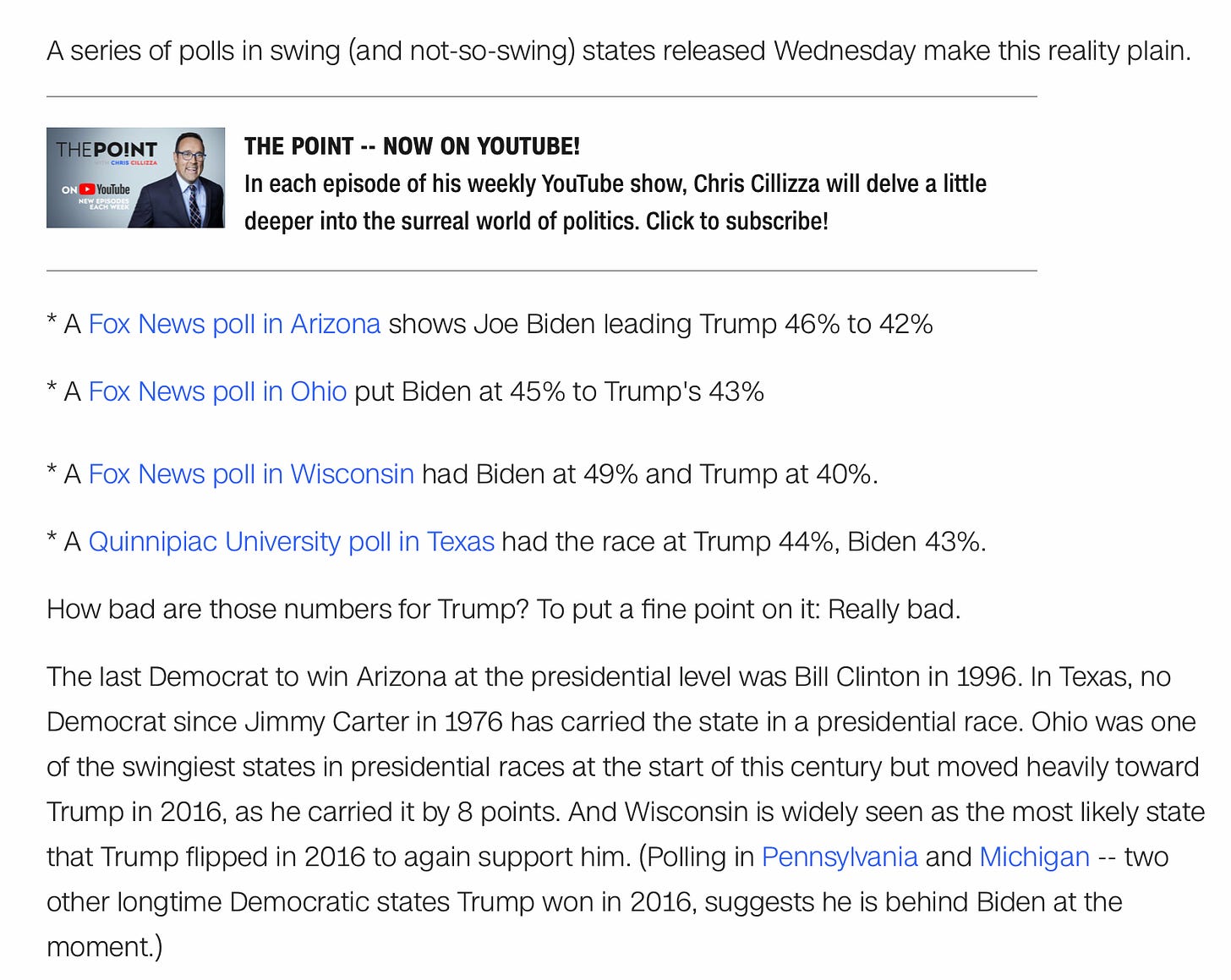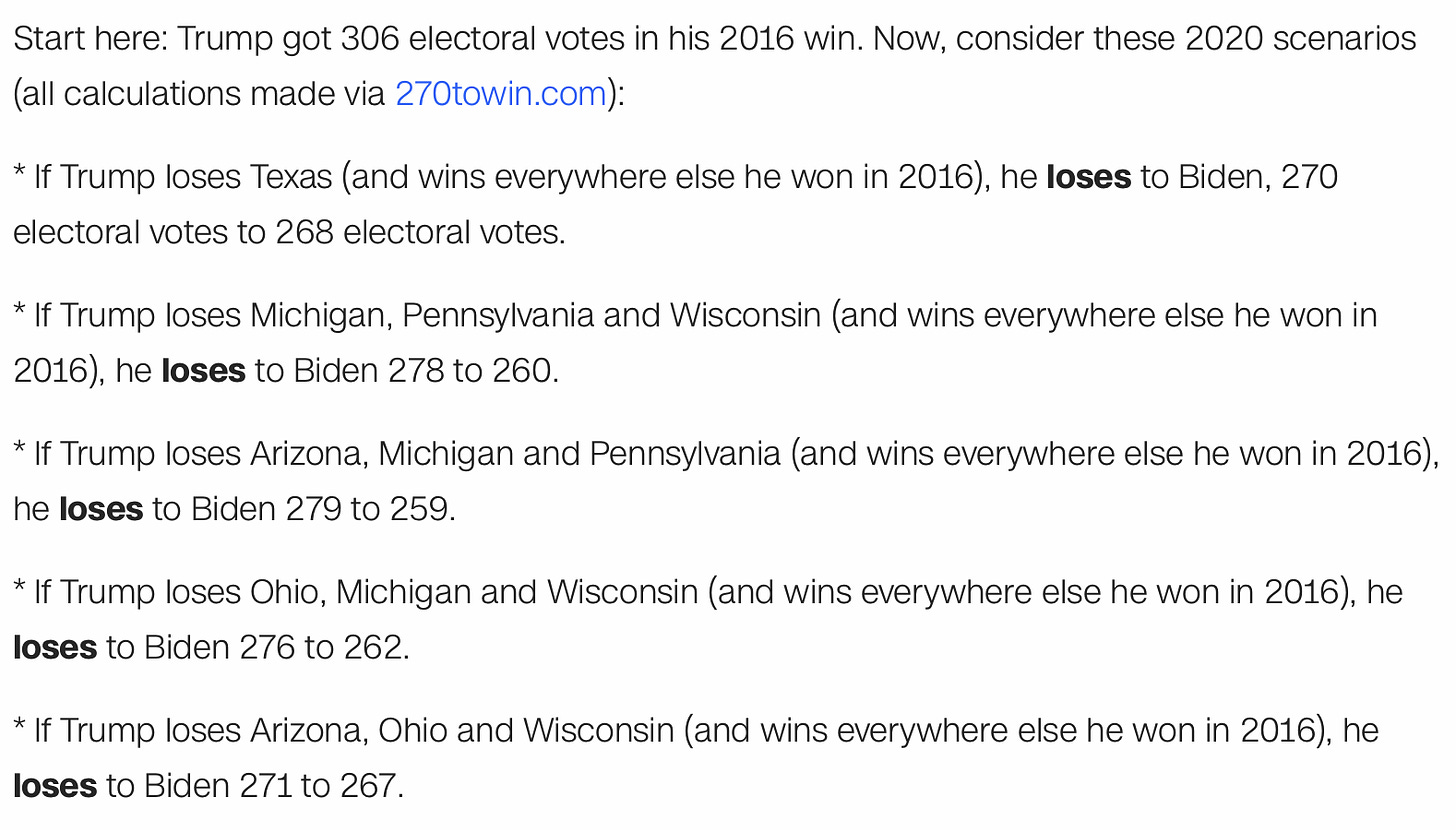Trump is doomed! Biden is doomed! Trump is back on top! Wait...
Pump the breaks everyone. You have to take a holistic, long view of the data.
At some point I should actually look at the data, but I’ve noticed a particularly predictable pattern in my Twitter feed whereby posts about polls that favor Joe Biden get about a million and a half more retweets than those where Donald Trump is doing surprisingly well. Maybe that’s because the people I follow are mostly journalists and academics and lean left politically? There’s also this particularly annoying habit for some high-profile political journalists to emphasize every single ebb and flow of the data driving our forecasts, so it could be a news/traffic-interest thing. But I digress. The point is that if I’ve seen this, maybe y’all have too—and maybe that’s tilting our conversation about the election.
I certainly haven’t been shy to voice my bullishness on Joe Biden. I think the betting markets and most pundits are putting his chances of election far too low, for example, and I’ve said as much publicly. But I’m also usually careful to remind y’all that one poll is just that—one poll—and not the single best predictor of what will happen in November. It’s better to take an average and things could change a lot by the time the election rolls around.
That’s why it frustrates me so much when I see breathless coverage of the horse race that is usually (a) based on one or just a few polls and (b) completely ignorant of any sophisticated, quantitative analysis of the race. This article by Chris Cillizza is one poignant example:

He starts the article by featuring some of the best numbers Joe Biden has had all cycle—certainly better than his average performance in the corresponding states. And the article is not framed in terms of how right or wrong the polls could be, but at how good the numbers are based on a few historical comparisons. (And he puts the information that might cut a bit against his point, like the fact that Biden is up just 3 or 3 points in Pennsylvania right now, at the end of his chunky para, like this.)
Then there is a mention of how the election could play out, and he only mentions scenarios in which Trump loses!

Cillizza’s attempt to talk about things probabilistically also falls flat:
The point here is not to say any of these electoral map scenarios are locked in. After all, we are still 152 days away from the November 3 election. (And, yes, I counted.)
Rather, they are to note that Biden, as of right now, has a WHOLE lot of different paths to 270 electoral votes, while Trump has a dwindling number. And of course, the polls on released on Wednesday don't even deal with potential trouble spots for Trump in Florida, North Carolina and Georgia -- all of which he won in 2016.
But he implies that all of these different events have independent probabilities of winning—when in reality, if polls are off by just 4 percentage points (a pretty mild historical error at this point in the cycle!) Biden would lose the electoral college majority, and the election.
This is so mind-bogglingly uninformative to me. Ok, we get it, these few polls are bad for Trump. But most of us have the capacity to be smarter about polls than this. Maybe you could use a simple aggregation + simulation model? Perhaps a sophisticated one that corrected for house effects, or projects how the future of the cycle might evolve?
Why doesn’t CNN have a fancy electoral forecast out right now? They have plenty of resources to make one (or to hire the people who could). Why are we still relying on outdated analyses of single polls to give readers their understanding of the horse race? I suspect the answer is that it drives traffic more than a polling aggregate that says “Biden is ahead, nothing has really changed, go back to your lives.”
Alas, that is the informed truth.




Cillizza hasn't had an interesting thought in many years. Best just to ignore his drivel.
Plouffe's book is great, everyone should read it.
Plouffe had some very simple advice to Democrats I heard recently, to wit:
-- push back on bad info/misleading data/false comments on social media,
-- contribute money
-- engage, volunteer to work in a campaign
-- interact with people; conversation; "register, vote"
-- encourage people to vote early
-- help with GOTV efforts, direct efforts at new voters and non-voters
-- focus on Florida
Anyone can do those things. Success means victory in November.
If media frenzy/clicks about individual polls leads to more polls, that's good? I feel attention is flowing to state level polls.. maybe it leads to more ad-supported articles per week, but still.